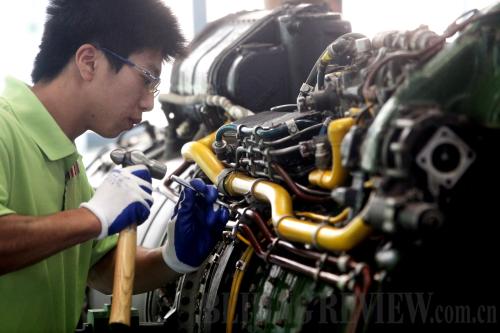|
 |
|
TEST OF SKILL: A contestant at a competition for students from vocational colleges nationwide in north China's Tianjin on June 27 (LIU DONGYUE) |
Two groups with very different demands exist simultaneously in China's job market: college graduates vying for white-collar jobs and employers scrounging for skilled blue-collar workers. A saturation of college graduates has resulted in declining starting salary of many white-collar jobs, whilst a shortage of skilled laborers has prompted blue-collar salaries to rise.
Li Qiang, a 34-year-old college-educated professional, recently decided to become a skilled blue-collar worker. On July 30, he enrolled at the Laiwu Polytechnic Institute in Laiwu City, east China's Shandong Province, to study welding and soldering.
After graduating from Qingdao University with a Master's degree in literature in 2008, Li has worked a variety of jobs, such as a copywriter in a real estate company, a reporter at a local newspaper in Lianyungang City in Jiangsu Province, a secretary in a private school and a human resources manager at a privately owned catering business.
Despite Li's master's degree, these jobs earned him salaries of no more than 4,000 yuan ($654) a month. With a child to support and a home mortgage to pay, Li found his earnings difficult to live off and decided to turn to an alternative.
In his search for another new job, Li found that skilled electricians and welders could make twice as much as he was. After careful consideration, he decided to enroll in the Laiwu Polytechnic Institute's welding and soldering program and become a blue-collar worker after graduation.
"With all the financial struggles in my life that I experienced as a white-collar worker, I thought I'd like to choose a new career path," Li said.
Changing status
Between the 1950s and 70s, when China was still a planned economy, blue-collar workers were ranked high in the social hierarchy, ahead of farmers, business people and academics.
After the implementation of reform and the opening-up policy began about three decades ago, society began to value university education and entrepreneurship along with the establishment of a market economy, which brought the social status of physical laborers down.
"The nature of their jobs means blue-collar workers often work long hours. As a consequence, many people are unwilling to take such jobs," said Shang Chongsheng, a sociology professor at Wuhan University in Hubei Province.
On the other hand, in the 1980s and early 1990s, a university degree usually guaranteed a decent job in large cities.
But this is no longer the case following a rapid growth in university enrollment. Official data show that in 1977, only 3.4 percent of applicants were admitted into regular institutions of higher learning. In 1998, 1.08 million students, or 34 percent of those taking the national college entrance examination, were admitted into undergraduate programs.
The government began to dramatically expand university enrollment in 1999. In that year, 1.6 million students, or 48 percent of applicants, were accepted. Enrollment continued to rise all the way through to 2012, when 6.85 million students, or 75 percent of applicants, entered universities.
This year, 6.99 million students graduated from universities, 190,000 more than last year and they have to face a dismal job market.
Higher education consulting firm MyCOS Institute surveyed graduating college students between October 29, 2012 and April 10, 2013, and found that only 26 percent of those graduating with a master's degree and 35 percent of those with a bachelor's degree had signed employment contracts. These numbers were both lower than the 37 percent and 47 percent respectively in the same period last year.
| 